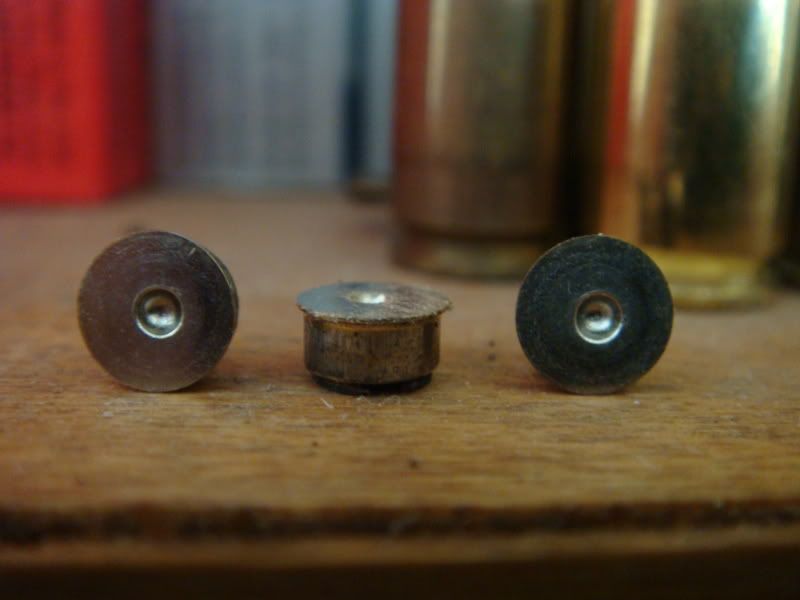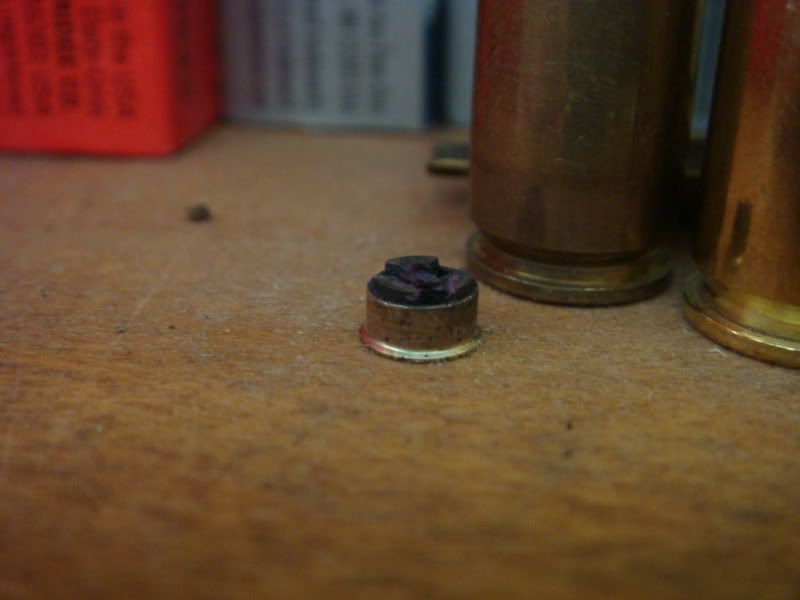

 The Accurate Reloading Forums
The Accurate Reloading Forums  THE ACCURATE RELOADING.COM FORUMS
THE ACCURATE RELOADING.COM FORUMS  Guns, Politics, Gunsmithing & Reloading
Guns, Politics, Gunsmithing & Reloading  Reloading
Reloading  How bad are these primers?
How bad are these primers?Go  | New  | Find  | Notify  | Tools  | Reply  |  |
| One of Us |
HEre are some primers from some reloading we did last week. New R-P brass 71.5 gr RL 15 (Right at max from Barnes book) Fed 215 300Gr TSX at 3.570 Light Factory Crimp Avg 2511 fps, very consistent load. Now, some of these primers were from the startup loads from 69 to 70 gr. but I did not keep track of them as they came out of the brass. No other signs of pressure, easy bolt lift, no marks on cases etc. Factory Federal TSX's had a very small flange at the top. I'm about to load this brass again for this next week. Is it possible 1X brass might show less pressure? Any thoughts are appreciated! | ||
|
One of Us |
This looks like a headspacing problem where the primer is backing too far out when firing and not reseating into primer pocket Not a pressure problem Caliber? 375 H & H? These were from a headspace problem   ____________________________________ There are those who would misteach us that to stick in a rut is consistency - and a virtue, and that to climb out of the rut is inconsistency - and a vice. - Mark Twain | Chinese Proverb: When someone shares something of value with you and you benefit from it, you have a moral obligation to share it with others. ___________________________________ | |||
|
| one of us |
Not bad, remember they get pushed out of the case, and are than reseated by the case as it moves back under pressure (I suspect your most "mushroomed" ones came from your starting loads) Below are a Mid-range, a book max (both from my 30-06), and a overload (working up for my 300RUM Imp). Last photo is the case the overload came out of.    | |||
|
| One of Us |
Sorry, yes a 375 H&H. | |||
|
| One of Us |
The 375 H&H should be head spacing on the belt and you should not get any hat brim from safe loads. I would suggest that if here is a head space problem, all your primers would have a hat brim. From the photos I notic that the 3 on the left have a hat brim and those on the right are fine. I would stik to a powder charge that does not produce a hat brim on the primer. I have no experience with a 375 H&H but I do not chase max velocities on my 9.3X62. "When the wind stops....start rowing. When the wind starts, get the sail up quick." | |||
|
| One of Us |
Try just neck sizing instead of fl.Should help with pressure somewhat.Also follow barnes suggestions for seating depth on these bullets.I think they still want 50 thousands off the lands. | |||
|
| one of us |
The shape of the deprimed primers is typical of loads fired with new (or "full length" sized) brass. As is sadly often the case with rifles for belted rounds, their chambers are overly generous, as is the cut for the belt, leaving them with non-dangerous but overly generous headspace. Remember, "headspace" is not a constant, but is the relationship of the chamber to the datum point of the brass which you put in it. Either a "long" chamber or "short" brass result in greater-than-desired headspace. The cure is to simply resize the brass only as much as needed (by backing the FL sizer off of the shellholder a few one-hundredths) so that the resized brass re-enters the chamber without excessive resistance. If you do this, the same loads in the next firing will show no untoward expansion of the base of the removed primers. | |||
|
| One of Us |
Thanks for the info. I hope to get back to the range this week, so we will see. I did FL resize these cases for the next round, measuring the base of the case and just a bit forward down toward the mouth of the case and also compared them to the new brass. The fired cases were about .0045 to .0050 larger than the factory new cases. FL resizing did not shrink the diameter anywhere near the belt. THe base of the die measures about .508 so this makes sense. With the shoulder the same shape at the chamber now and the brass now fireformed, it'll be interesting to see the result. Thanks! | |||
|
| Moderator |
looks like headspace to me -- with them being at sloping angles, i would expect that.. back off 2 grains and try new brass ... opinions vary band of bubbas and STC hunting Club Information on Ammoguide about the416AR, 458AR, 470AR, 500AR What is an AR round? Case Drawings 416-458-470AR and 500AR. 476AR, http://www.weaponsmith.com | |||
|
| one of us |
Ummm, I'm not sure you understand what the potential problem is. It has nothing to do with the diameter of the brass, but with its length from the boltface to the slope of the shoulder against which the bottlenecked case comes to rest to preclude its moving futher forward upon being struck by the firing pin. If you "full length resize" with a die which pushes the shoulder back (as most of them surely will), then you have re-created the excessive headspace which existed on the previous firing. It is only when you back the sizind die off of the shellholder so as not to push the shoulder back that your fired case will be properly headspaced for the chamber. The existence of the belt is somewhat meaningless since its relationship to the chamber recess against which it comes to rest is always unchanged between firings, meaning that if it is too short, or the chamber too long at that point, it will continue to provide inadeqauately short ("excessive") headspace; thus it is only by headspacing off of the shoulder of the cartridge (and the .375 H&H has plenty of shoulder for this purpose) that you will remedy your problem with the "crowned" primers. If you continue to "full length resize", the excessive working of the brass will both cause the brass to grow longer in the neck and require trimming, and will also cause the formation of a thin spot in the case wall near the head just aft of the "pressure ring". This thin spot will, after a few firings, be thin enough that it will no longer contain the normal internal pressure of a firing round and will rupture, resulting in a potentially dangerous backflow of gas through the action toward the shooter's face (and maybe blowing the extractor off depending on what action it is), and possibly causing a complete head separation which will put the gun temporarily out of action. Always size your cases, especially in a rifle which exhibits longer-than-desired headspace, the minimum amount necessary for the fired and reloaded case to re-enter the chamber. | |||
|
| One of Us |
I understand headspace no problem and the measurements I gave were only a comparison of new, once-fired and once-fired re-sized cases relative to the actual case dimensions. Wouldn't once-fired brass show lower pressures due to its being fireformed and thus a teeny bit greater capacity? In theory at least? I cannot measure a difference in the location of the shoulder on once-fired brass compared to FL re-sized brass, they seem to be in the exact same place before and after resizing. Trimming was not necessary on this brass this round, it also didn't measure any different. between 2.8390 and 2.8405. I will see this week how they look and try your tip. The gun will be going to get some work done on it soon and I was going to have all the details checked out on it anyway. Cheers. | |||
|
| one of us |
While the internal capacity of the case (alone) may be slightly larger, the effective capacity (what counts) is the "chamber volume minus the brass volume", and that doesn't change with fire forming. | |||
|
| One of Us |
hmmmm, muy interesante.. | |||
|
| one of us |
Well said. Doesn't matter what size the garbage bag is, it's the size of the trash can you put it in which limits its capacity. | |||
|
| One of Us |
So if I have a 375 weatherby and fire a 375 HH case with 71 gr of powder it will perform the same as a 375 weatherby case with 71 gr of powder? The expansion of the case to the chamber doesn't affect anything? Is that what your example is to illustrate? Thanks. | |||
|
| one of us |
That would be correct | |||
|
| One of Us |
Pretty interesting...again... Thanks! | |||
|
| one of us |
I have found negligible difference in almost that exact instance, fire forming a .375 H&H in a .375 Ackely chamber. The velocity is the same regardless of whether the case has previously been fireformed. Of course, this assumes that you are using a powder fast/dense enough that the full charge can be loaded in the unformed case -- if using a slower powder and the full charge will not fit into the unformed case then there is no way to compare the two. I've also fireformed necked-down .300 H&H brass into 7mm STW, 6mm Rem into 6mm AI, and .22 Hornet into .22 K-Hornet. With the same loads there is no detectable difference in velocities. Frequently, depending on the gun and how it headspaces, there is no difference in accuracy. | |||
|
| Powered by Social Strata |
| Please Wait. Your request is being processed... |
|

Visit our on-line store for AR Memorabilia

